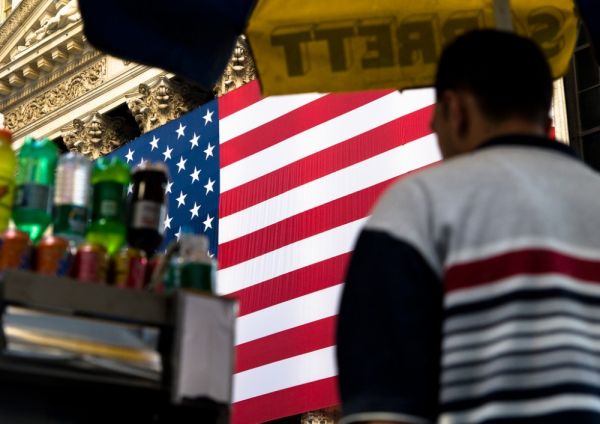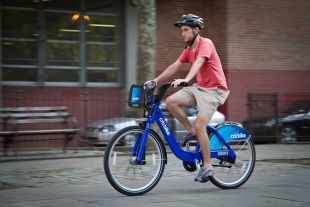When Bikeshare Displaces Street Vendors, Everyone Loses

A Citibike rack in downtown Manhattan will displace street vendors who have long occupied the space. Photo credit: Angelo DeSantis via Flickr Creative Commons
New York City’s bikeshare system launches on Monday. In a guest blog post, Sean Basinski, director of the Street Vendor Project, argues that the system’s docking stations must not displace vendors who were there first.
A month ago, city workers placed a large plastic bike rack on Liberty Street in Lower Manhattan. It is a docking station for Citibike, an ambitious new bike-share initiative modeled after successful programs in Paris, London, and Washington DC. It looks no different from hundreds of others around the city. But this docking station is different. It reveals, in very stark terms, how poor city planning can harm workers in the informal sector.
For years, a group of street vendors have worked on that corner. All are immigrants who sell food to nearby office workers and tourists. Doris Yao makes dumplings inspired by the street food of her native Taiwan. Miguel Susano-Alatorre and his brother Sergio, originally from Mexico, sell award-winning vegetarian food. Other vendors sell fruit smoothies, kati rolls and pad Thai. In total, fifteen families were supported by the carts on that corner.
Until last month. The vendors are being evicted from their spaces to make way for the Liberty Street bike rack, an eviction for which they received no notice. Worse still, they now have no place else to go. Most other streets in New York’s dense financial district have been declared off-limits by law, after lobbying by the neighborhood’s powerful Business Improvement District. Others nearby zones had been closed due to security concerns after September 11th. The few remaining blocks are occupied by other vendors.
While categorized by the city as “mobile food vendors,” the Liberty Street vendors are mobile only in theory. Unlike some high-end food trucks that move from place to place, these immigrant vendors lack Twitter accounts and GPS trackers. Like most vendors, they have built up their businesses over time by providing quality food and service to their loyal customers, who are now wondering where those Liberty Street vendors have gone.

The city’s new bikeshare system launches on Monday.
In New York and elsewhere, street vendors are integral to successful urban economies. Vending provides employment to millions of people in cities around the world who often cannot find work in the formal sector. Pushcarts and sidewalk tables act as business incubators for many entrepreneurs who eventually evolve those businesses into brick-and-mortar shops. Vendors also keep prices down in general, saving millions of dollars for low-income people who can’t afford to dine in fancy restaurants.
But even more broadly, vendors make urban spaces more livable. As the famed urbanist William Whyte observed, the presence of vendors can dramatically improve the social life of our streets. As independent, locally-owned small businesses, vendors provide an alternative to anonymous corporate chains. They also play an important public safety function — in 2010, a t-shirt vendor in Times Square was the first to spot a car bomb and report it to police.
City planners around the world frequently ignore these benefits – and vendors’ voices – when making decisions. Barely a week goes by without news that, somewhere in the world, vendors are being evicted from the spaces in which they work. In February, displaced vendors held protests in Mumbai, asking the Minister of Urban Poverty Alleviation to intervene on their behalf. In April, similar demonstrations turned into a riot in Jakarta after vending stalls were torn down by city authorities.
Seeing this pattern, the global vendor organization StreetNet International has led a campaign called World Class Cities for All which is helping mobilize vendors for inclusion in urban development plans. Right now, for instance, they’re establishing a coalition of informal vendors in Brazil to make sure those vendors are not pushed aside by urban renewal projects in the run up to the World Cup. It’s telling that even Mary Robinson, former UN High Commissioner of Human Rights, has gotten involved on the vendors’ behalf – this is a human rights issue.
Inclusive city planning is especially important in dense cities like New York, where public space is scarce and hotly contested. Vending has been heavily regulated in Manhattan since 1691, when peddlers were forbidden from selling during certain hours when competing public markets were open. In the 1930s, vending was nearly abolished under Mayor LaGuardia, who sought to “clean up” the streets in preparation for the World’s Fair. The last decade, under billionaire Mayor Michael Bloomberg, has seen further privatization of public spaces as the city is rebranded as a “luxury product.”
Whether street vendors have a place in Bloomberg’s luxury city remains to be seen. For the vendors on Liberty Street, the solution seems simple enough. They are asking for the bike station to be moved into the street just a few feet away, where both vendors and bikers can peacefully coexist. They have organized themselves to be heard, making videos and holding press conferences and demonstrating in front of the Department of Transportation to plead their case. Yet while similar bike stations have been moved at the urging of wealthy property owners, city officials have declared that the station on Liberty Street will stay.
Instead of responding with protests after the fact, officials in New York and other cities should think about vendors before they make their decisions. Unlike with Citibike, where officials met with nearby building owners but spoke not a word to the vendors, they should notify them of proposed changes that will affect their livelihoods. And they should listen to the vendors’ concerns. Such an outlook will not only benefit the vendors, it will make our urban economies stronger and our cities more sustainable, livable places.
Sean Basinski is a former New York City street vendor who is currently the director of the Street Vendor Project in New York City. In 2009, Sean researched and wrote about the informal economy as a Fulbright Scholar in Lagos, Nigeria.





